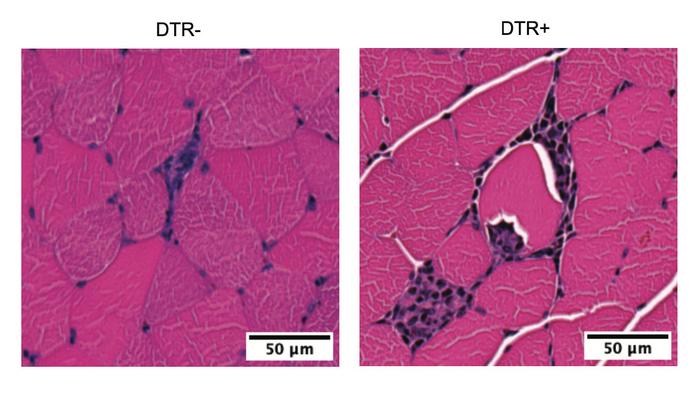
In a groundbreaking cohort study emerging from China, researchers have explored the complex interplay between body mass index (BMI), depressive symptoms, and metabolic syndrome in adults over the age of 45. This investigation not only illuminates the intricate cross-sectional and longitudinal associations between these health parameters but also delves into the mediating influence of metabolic syndrome — a multifaceted condition characterized by a cluster of metabolic risk factors. The findings, published in the International Journal of Obesity, shed new light on how physical and mental health intersect in middle-aged and elderly populations, offering potential pathways for intervention in the global fight against depression.
Depression and obesity have long been individually recognized as major public health challenges, each contributing significantly to morbidity and mortality worldwide. However, the relationship between the two conditions is complex and bidirectional. Higher BMI has been linked to the increased prevalence of depressive symptoms, yet the biological and behavioral pathways mediating this relationship remain elusive. The current study addresses this gap by integrating metabolic syndrome — which includes conditions such as hypertension, hyperglycemia, elevated triglycerides, low HDL cholesterol, and abdominal obesity — to comprehend its role as a bridge between BMI and depression trajectories over time.
The research capitalized on a robust longitudinal design, capturing both cross-sectional snapshots and dynamic changes in depressive symptoms among a cohort aged 45 and older, a demographic often underrepresented in mental health studies despite their higher risk profile. Through meticulous data collection and analytic rigor, the team evaluated how baseline BMI categorized individuals, and tracked depressive symptom changes over subsequent years. What emerged was a nuanced understanding of how metabolic dysregulation might amplify or modulate the risk of depression associated with elevated body weight.
.adsslot_Y45Ahim2Ty{ width:728px !important; height:90px !important; }
@media (max-width:1199px) { .adsslot_Y45Ahim2Ty{ width:468px !important; height:60px !important; } }
@media (max-width:767px) { .adsslot_Y45Ahim2Ty{ width:320px !important; height:50px !important; } }
ADVERTISEMENT
One of the pivotal technical contributions of this study lies in its sophisticated statistical modeling of mediation effects. By employing advanced longitudinal mediation analysis frameworks, the researchers were able to distinguish direct effects of BMI on depression trajectories from those indirect effects channeled through metabolic syndrome components. Such models took into account confounding variables such as age, sex, socioeconomic status, lifestyle factors, and comorbidities — ensuring that the unveiled mechanisms are statistically robust and clinically relevant.
The longitudinal perspective adopted by the study enhances its significance. Previous literature has often relied on cross-sectional correlations, which provide only a temporal snapshot and are prone to reverse causality bias. In contrast, the current work systematically tracked individuals over multiple time points, enabling the observation of how changes in BMI and metabolic health precede or coincide with fluctuations in depressive symptom severity. This temporal dimension is critical for designing preventive strategies and clinical interventions aimed at mitigating depression risk.
Biologically, the findings underscore metabolic syndrome as more than a mere cluster of risk factors; it may function as a pathophysiological conduit connecting obesity and mood disorders. Chronic low-grade inflammation, insulin resistance, and neuroendocrine dysregulation intrinsic to metabolic syndrome plausibly contribute to neurobiological alterations implicated in depression. The study highlights how metabolic disturbances can affect brain function, neurotransmitter systems, and overall psychological well-being, thus reinforcing the need for integrated medical approaches.
Behavioral and psychosocial factors also interplay in this triad of BMI, metabolism, and depression. Metabolic syndrome is often accompanied by reduced physical activity, poor diet, and social isolation—each of which independently exacerbates depressive symptoms. The study’s findings advocate for holistic patient assessments that consider these interlaced variables rather than fragmented clinical pictures, thereby promoting more personalized care.
From a public health standpoint, the research carries profound implications. With the increasing prevalence of obesity and aging populations worldwide, metabolic syndrome is poised to become an ever-greater burden. Understanding its mediating role opens avenues for dual-targeted interventions that simultaneously address metabolic health and mental wellness. Screening for metabolic syndrome components in overweight or obese older adults could enable early identification of those at heightened risk for depression, facilitating timely treatment.
Clinically, the study suggests that traditional approaches focusing solely on psychological symptoms may fall short if underlying metabolic abnormalities remain unaddressed. Integrative treatment regimens combining lifestyle modification, pharmacotherapy, and psychological support could yield superior outcomes. For example, weight loss, dietary improvement, and physical exercise not only ameliorate metabolic parameters but also have documented antidepressant effects, emphasizing the synergy in tackling both physical and mental health.
Moreover, the findings prompt further research into the biological pathways linking metabolic syndrome with depression. Understanding molecular mediators—such as inflammatory cytokines, hormonal imbalances, and neurotrophic factors—that may be altered in individuals with high BMI can help identify novel therapeutic targets. Such mechanistic insights could revolutionize how clinicians perceive and manage coexisting metabolic and psychiatric conditions.
It is also important to recognize the sociocultural context of the study. Conducted in China, where rapid socioeconomic changes have contributed to lifestyle shifts and rising obesity rates, the research reflects broader epidemiological transitions. The applicability of findings to other populations can inform global health policy, especially in countries facing similar demographic and epidemiological challenges.
This research enriches the existing literature by emphasizing that BMI alone does not fully account for depressive symptom trajectories. Instead, the mediating presence of metabolic syndrome plays a crucial role in elevating risk. By disentangling these complex relationships, the study advocates for multi-dimensional health strategies that transcend traditional silos of medicine, integrating metabolic, psychological, and social care perspectives.
Importantly, the cohort design with its extensive follow-up period strengthens causal inference, suggesting that metabolic syndrome is not just a correlate but potentially part of the causal pathway linking obesity to depression. Healthcare providers and policy makers can leverage these insights to design screening programs and targeted interventions that reflect the interconnectedness of these conditions.
In summary, this pioneering study paints a compelling picture of the intertwined nature of physical and mental health, anchored by metabolic syndrome’s mediating role in the obesity-depression nexus. It calls for a paradigm shift in both research and clinical practice, emphasizing interdisciplinary collaboration and comprehensive patient management. As the global population ages and obesity rates climb, such nuanced understanding becomes indispensable in reducing the burden of depression and improving quality of life.
Looking forward, future investigations may explore how specific components of metabolic syndrome differentially influence depressive symptoms, and whether therapeutic modulation of these factors can alter depression trajectories. Additionally, expanding research into younger cohorts, diverse ethnic groups, and incorporating genetic or epigenetic data could deepen insight into these multifactorial relationships.
Ultimately, this study signifies an important step towards unraveling the biological and behavioral convolutions underpinning mental health disorders and spotlights metabolic health as a promising target in the prevention and management of late-life depression. The multilayered findings presented not only advance scientific understanding but also hold tangible promise for enhancing clinical outcomes in a vulnerable and expanding sector of the population.
Subject of Research: The cross-sectional and longitudinal relationship between BMI and depressive symptoms, and the mediating role of metabolic syndrome in middle-aged and elderly adults.
Article Title: Metabolic syndrome in the association of BMI and trajectory of depressive symptoms in middle-aged and elderly population: a cohort study from China.
Article References:
Dong, Y., Hu, Q., Wang, Y. et al. Metabolic syndrome in the association of BMI and trajectory of depressive symptoms in middle-aged and elderly population: a cohort study from China. Int J Obes (2025).
Image Credits: AI Generated
DOI:
Tags: adult health over 45BMI and mental healthChina health researchcohort study on obesityintersection of physical and mental healthlongitudinal study on BMImetabolic risk factors and mental healthMetabolic syndrome and depressionobesity and depressive symptomspathways for depression interventionpublic health challenges obesityrelationship between BMI and depression








No Comments
Leave a comment Cancel